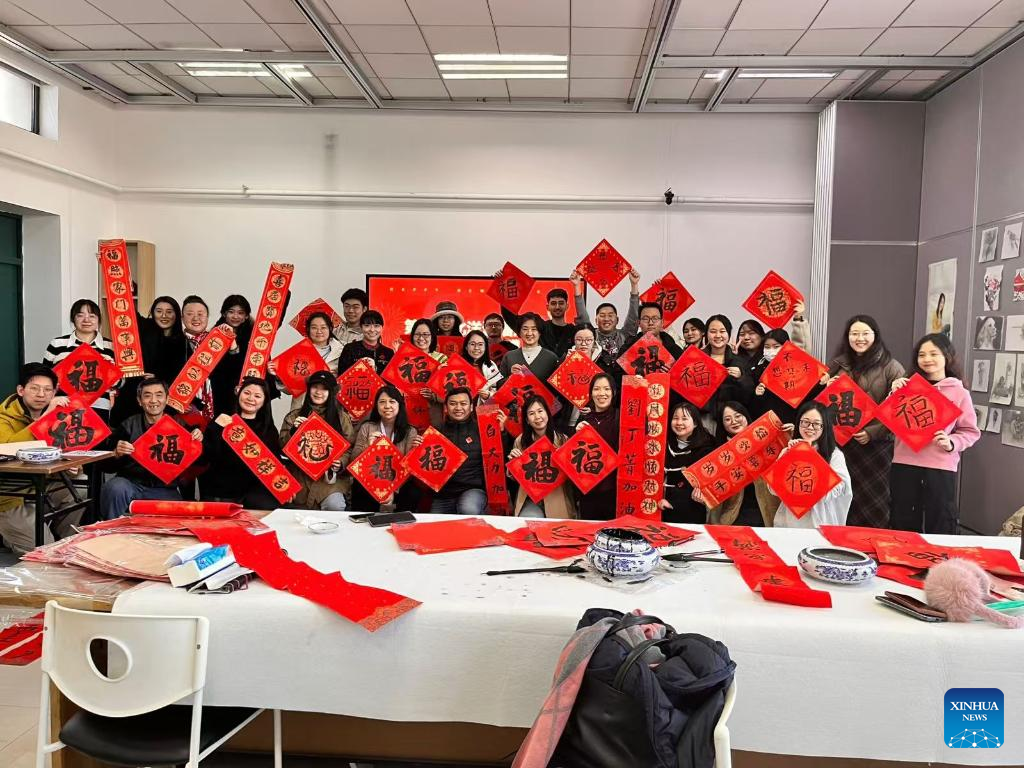
Indonesian teachers learn to write the Chinese character "Fu," which means "good fortune," in various calligraphy styles in north China's Tianjin on Jan. 7, 2025. (Xinhua)
TIANJIN, Jan. 18 (Xinhua) -- As they prepared to return home for winter break, a group of Indonesian teachers, who began their two-year postgraduate studies at Tianjin University in September 2024, composed an AI-generated song in Chinese, expressing their heartfelt gratitude and bittersweet feelings about leaving.
They are in the inaugural cohort of the International Chinese Education Master's Program for Indonesian Trilingual School Teachers.
As part of a class assignment on exploring AI's role in education, the project highlights the program's innovative approach to teaching. "It allowed us to express our shared aspirations and dreams," said Suviana, a Chinese-Indonesian teacher and one of the song's creators.
The master's program, launched in December 2023, is a collaborative initiative by the Chinese Ministry of Education, Tianjin University and the Indonesian Trilingual School Association. It aims to train Indonesian Chinese-language teachers and equip them with advanced skills to enhance Chinese education in their home country.
In 2024, the first batch of 39 teachers from Indonesia began their two-year academic journey in north China's Tianjin. "We're not just teachers, but cultural ambassadors," said Saifus Somad, one of the Indonesian teachers.
For Suviana, the Chinese language has always been more than just a subject -- it's a key to understanding her heritage. "Learning a language is the first step to understanding a culture," she said.
After years of teaching Chinese in Jakarta, she has seen how the language can open doors for students from all backgrounds.
With the in-depth advancement of the Belt and Road Initiative, Suviana has found that more and more Indonesian families are beginning to value Chinese language learning.
"It's not just Chinese-Indonesian families. Parents from other communities are learning Chinese with their kids. They see it as a skill that can change their futures," Suviana said.
"Studying Chinese in high school gave me a deeper appreciation of Chinese-Indonesian culture and helped break down barriers," said Saifus Somad, one of the few non-Chinese-Indonesian students in the program.
A Chinese teacher in East Java, Saifus Somad believes that the language is a bridge for fostering understanding and harmony. "Learning Chinese gives young Indonesians more opportunities and helps them connect with Chinese culture," he said.
During their time in Tianjin, they experienced firsthand the richness of Chinese culture. They have composed songs with AI tools, studied classical poetry, practiced calligraphy, and even performed an Indonesian-inspired version of A Dream of Red Mansions at a university event.
"These experiences have deepened my understanding of Chinese culture," Suviana said. "When we studied classical poetry, we were moved by the line, 'A letter from home is worth a thousand pieces of gold.' Many of us were in tears because we could relate so strongly to that feeling of longing."
Saifus Somad and his classmates plan to record this AI-composed song and take it to Chinese classes in Indonesia in the future, allowing more students to feel the joy of language learning and the charm of culture.
This program is part of Tianjin University's broader mission to promote international education and cultural exchange. By fostering collaboration with ASEAN countries and creating platforms for mutual learning, the university is helping to build stronger ties between China and its neighbors.
For Suviana and her classmates, the program has been life-changing. "This experience has strengthened my sense of purpose. I hope more Indonesian teachers can follow in our footsteps, come to China, study at Tianjin University, and become bridges between our two nations," Suviana said. ■

Indonesian teachers pose for a group photo in Tianjin University in north China's Tianjin on Dec. 28, 2024. (Xinhua)







